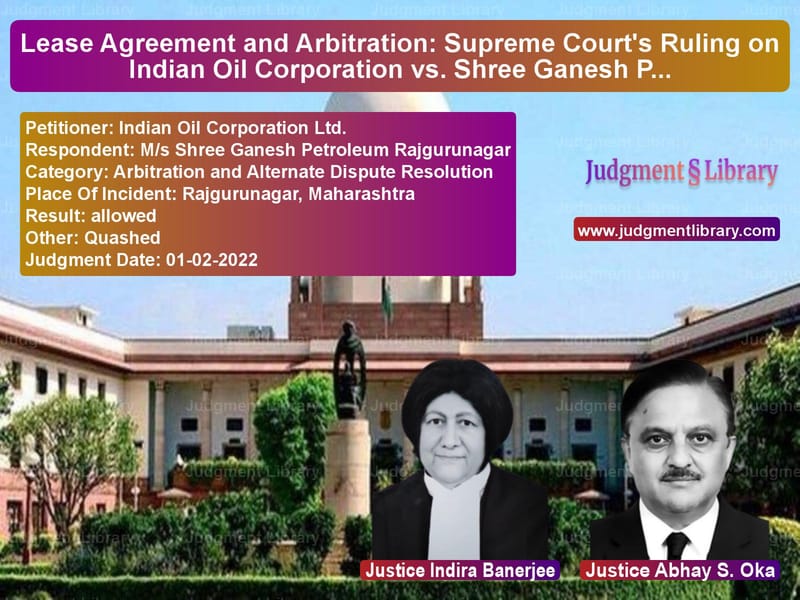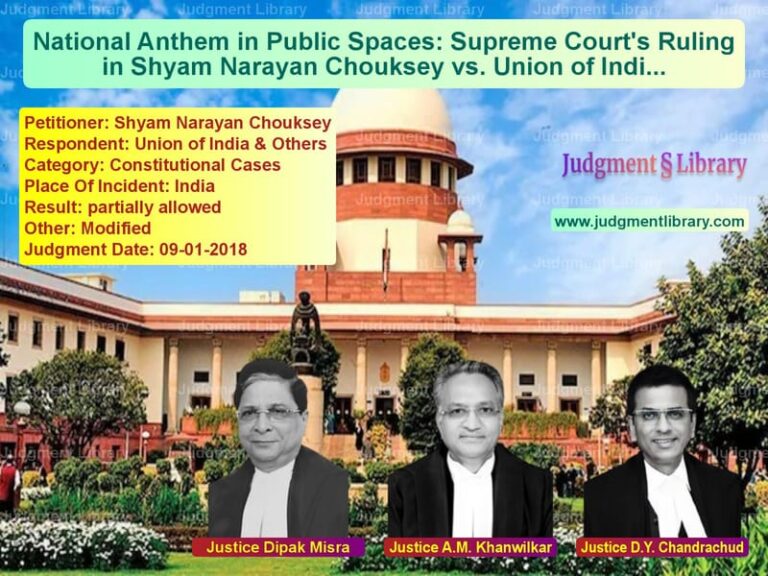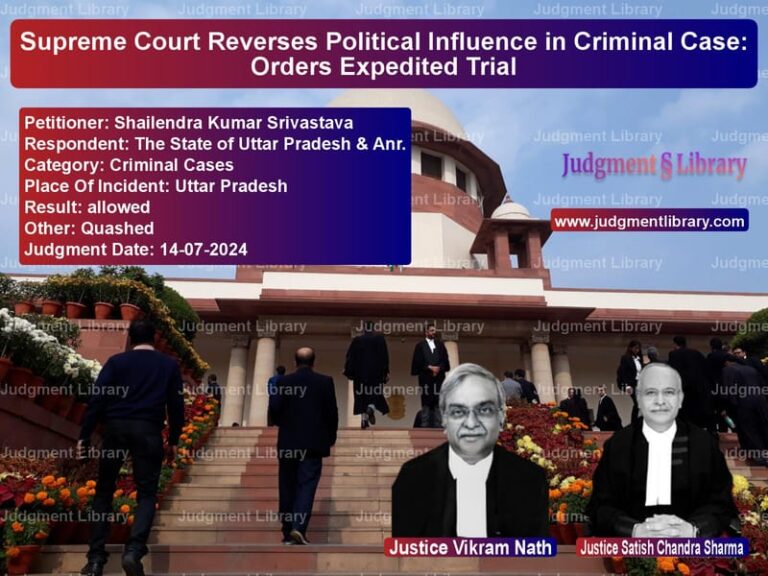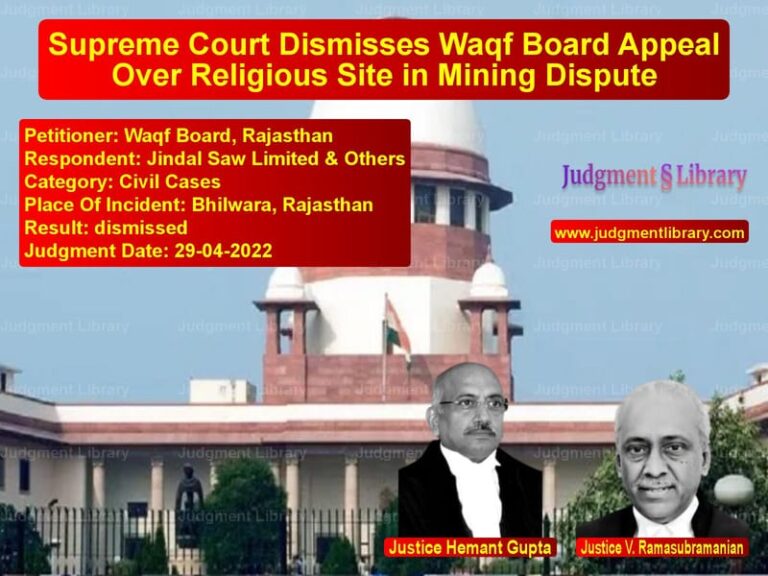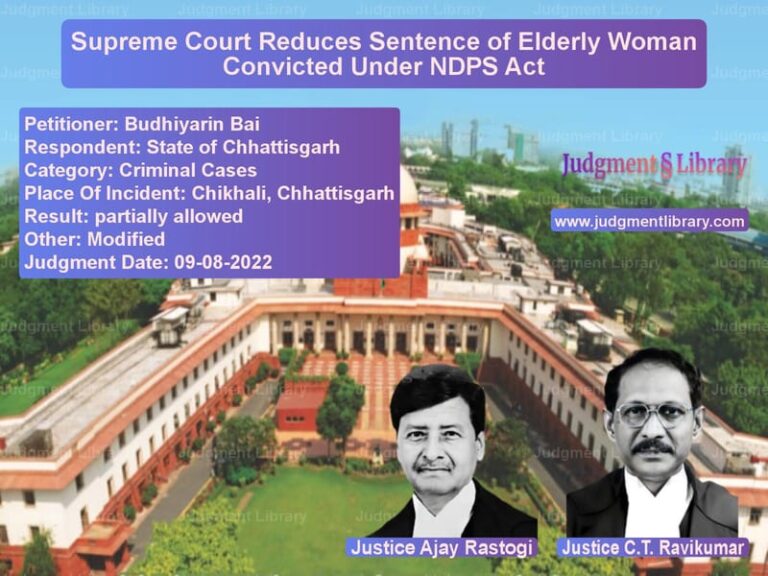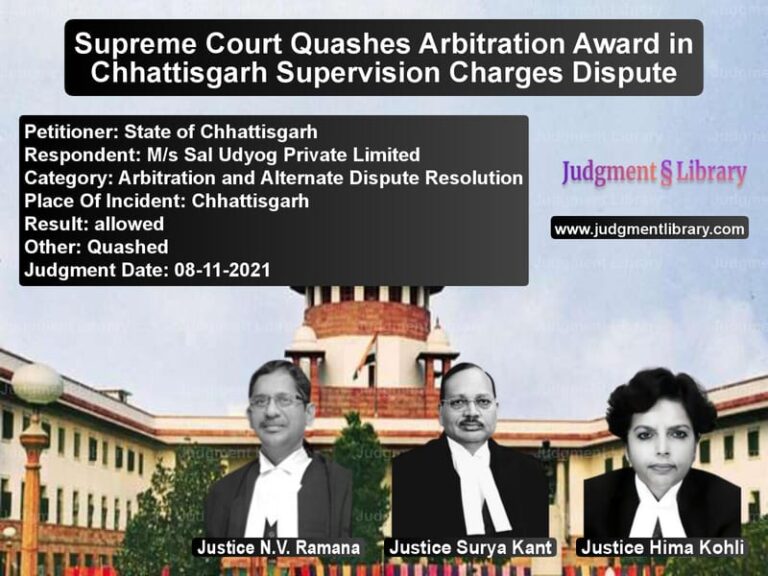Lease Agreement and Arbitration: Supreme Court’s Ruling on Indian Oil Corporation vs. Shree Ganesh Petroleum
The case of Indian Oil Corporation Ltd. vs. M/s Shree Ganesh Petroleum Rajgurunagar deals with the validity of an arbitral award that modified a lease agreement, increasing the rent and altering the lease period. The Supreme Court had to determine whether the Arbitrator had the jurisdiction to modify the lease terms, and whether the High Court erred in upholding the award.
The ruling clarifies the limits of arbitral authority and emphasizes that contractual terms, unless unconscionable, cannot be unilaterally altered through arbitration.
Background of the Case
The dispute arose between Indian Oil Corporation Ltd. (IOC) and Shree Ganesh Petroleum, the lessor of a property leased to IOC for setting up a retail petrol outlet. The lease agreement, executed on 20th September 2005, was for a term of 29 years, with a monthly rent of ₹1,750. The agreement allowed IOC to sublet the premises and appoint dealers without requiring the lessor’s consent.
Additionally, IOC appointed the respondent as the dealer for the petrol outlet under a separate dealership agreement dated 15th November 2006, for an initial term of 15 years.
The dispute began when IOC terminated the dealership agreement on 20th August 2008 due to alleged violations of the Marketing Discipline Guidelines (MDG). The respondent challenged the termination before an Arbitrator, appointed under the dealership agreement.
Key Legal Issues
The main legal questions before the Supreme Court were:
- Did the Arbitrator have jurisdiction to modify the lease terms, including increasing the rent?
- Was the High Court justified in upholding the Arbitrator’s award?
- Did the lease agreement and dealership agreement form a composite contract, or were they independent agreements?
Arguments Before the Supreme Court
Appellant’s (IOC) Arguments
IOC, represented by its legal counsel, argued:
- The Arbitrator had no authority to decide on lease terms since the lease agreement contained a distinct arbitration clause requiring disputes to be arbitrated solely by IOC’s Managing Director.
- The dealership agreement, which provided for arbitration under IOC’s Director (Marketing), was separate from the lease agreement.
- The Arbitrator exceeded his jurisdiction by modifying the lease rent and period, which was not within the scope of the dealership agreement.
- The respondent willingly agreed to the lease rent of ₹1,750 in 2005, and challenging it later was an afterthought.
Respondent’s Arguments
The respondent, Shree Ganesh Petroleum, argued:
- The lease and dealership agreements were interconnected, as the dealership was granted on the assurance of a long-term lease.
- The rent of ₹1,750 was unfairly low and needed revision to reflect market conditions.
- The Arbitrator had the authority to increase the lease rent, considering the economic hardship faced by the respondent after the dealership termination.
- The District Court and High Court had rightly upheld the Arbitrator’s decision.
Supreme Court’s Judgment
The Supreme Court ruled in favor of IOC, setting aside the Arbitrator’s award and the High Court’s judgment. The key findings were:
- The lease and dealership agreements were independent contracts, governed by separate arbitration clauses.
- The Arbitrator, appointed under the dealership agreement, lacked jurisdiction to modify the lease terms.
- The lease agreement explicitly provided that any dispute regarding lease terms should be arbitrated by IOC’s Managing Director or a designated nominee.
- The respondent’s claim for increased rent was not within the scope of the arbitration proceedings under the dealership agreement.
The Supreme Court observed:
“The lease agreement and dealership agreement are distinct and independent contracts. The Arbitrator appointed under the dealership agreement could not have adjudicated disputes regarding lease terms.”
Key Observations from the Judgment
- Arbitral tribunals must act within the scope of the arbitration clause under which they are appointed.
- Contractual terms voluntarily agreed upon cannot be modified through arbitration unless found to be unconscionable.
- The principle of party autonomy in arbitration is paramount—parties cannot be forced into an arbitral process they did not agree upon.
- The High Court erred in upholding an award that altered contractually agreed terms outside the Arbitrator’s jurisdiction.
Impact of the Judgment
The ruling has significant implications for commercial contracts and arbitration:
- For Businesses: Clarifies that separate contracts require separate arbitration agreements.
- For Arbitration Proceedings: Reinforces that arbitrators cannot assume jurisdiction beyond the arbitration clause.
- For Landlords and Tenants: Ensures that lease terms are protected from arbitrary modifications unless explicitly allowed.
- For Courts: Establishes a precedent for reviewing arbitration awards to ensure arbitrators do not exceed their jurisdiction.
Conclusion
The Supreme Court’s decision in Indian Oil Corporation Ltd. vs. Shree Ganesh Petroleum reaffirms the importance of adhering to contractual arbitration clauses and preventing arbitrators from exceeding their jurisdiction. By setting aside an award that unilaterally modified lease terms, the Court has reinforced contractual sanctity and arbitration principles.
This ruling serves as a cautionary precedent for businesses and arbitration practitioners, emphasizing the need to respect distinct arbitration clauses within separate contracts.
Petitioner Name: Indian Oil Corporation Ltd..Respondent Name: M/s Shree Ganesh Petroleum Rajgurunagar.Judgment By: Justice Indira Banerjee, Justice Abhay S. Oka.Place Of Incident: Rajgurunagar, Maharashtra.Judgment Date: 01-02-2022.
Don’t miss out on the full details! Download the complete judgment in PDF format below and gain valuable insights instantly!
Download Judgment: indian-oil-corporati-vs-ms-shree-ganesh-pet-supreme-court-of-india-judgment-dated-01-02-2022.pdf
Directly Download Judgment: Directly download this Judgment
See all petitions in Arbitration Awards
See all petitions in Contract Disputes
See all petitions in Judgment by Indira Banerjee
See all petitions in Judgment by Abhay S. Oka
See all petitions in allowed
See all petitions in Quashed
See all petitions in supreme court of India judgments February 2022
See all petitions in 2022 judgments
See all posts in Arbitration and Alternate Dispute Resolution Category
See all allowed petitions in Arbitration and Alternate Dispute Resolution Category
See all Dismissed petitions in Arbitration and Alternate Dispute Resolution Category
See all partially allowed petitions in Arbitration and Alternate Dispute Resolution Category

